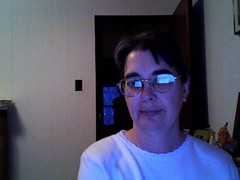When my friend MaryGail, a nurse, invited me to contribute a column on healing to our church's monthly newsletter, I was startled that she would ask me since I'm not in the medical field. In ruminating over the request (MaryGail is hard to refuse), it occured to me that some meanings of healing include mending a quarrel or broken relationship, and in that case perhaps I had something to say after all. Healing of relationships among Americans has been an increasing preoccupation of mine for several years. A disturbing trend had burst into my consciousness a number of years earlier: a sharp increase of rancorous, inflammatory, and divisive political speech that first surprised, and then alarmed, me.
Ranting diatribes seem to have become the order of the day on talk radio programming, with inflammatory rhetoric both on the right and the left that’s designed to get the blood boiling and the hearer riled up. It reminds me of the angry shouting by a constantly quarreling couple, whose relationship is at great risk of ending in divorce.
Can you remember (if you are old enough to remember the way it was before the late-eighties) when the norm in controversial public discourse on television and radio was calm, rational, and civil? Our leaders and media personalities disagreed without being disagreeable and heated invective was rarely heard on the airwaves. The “marriage” seemed a healthy and happy one. How, in a few short years, did we come to this? Why, too, didn’t it happen earlier? After all, surely Americans held opinions as firmly a couple of decades ago.
Few noticed a change in regulations of broadcast media in 1987 that removed the requirement for broadcasters to ensure a fair and equal balance of opinions be aired on issues of public importance. Without regulation, the opportunity to hear a broad range of viewpoints on any given issue declined precipitously while that of hearing a one-sided presentation increased abruptly. Perhaps our busy lives and all the choices of entertainment available distracted us from noticing what was happening to us.
So, over time we now have different background knowledge from one another and understand one another’s reasoning less and less. Our decisions then frequently fail to take into account the impact on others of a different perspective. Such decisions can chafe. How stable can laws end up being under those circumstances? Conflict and misunderstanding increase, while tolerance takes a nosedive. By contrast, decisions made after a thorough airing of all points of view often garner more of a consensus, because with understanding compromises usually are worked out.
Today many of us are distinctly uncomfortable talking about political opinions with those unlike ourselves. It feels risky; maybe we’ll spark angry retaliation directed toward us. People from across the political spectrum feel wounded and defensive. Even within a family, estrangement may be felt and the ability to communicate stifled. Are you experiencing any of these difficulties?
At a church conference in Corpus Christi a couple of years ago, one exhibit caught my eye: the Institute for Civility in Government. Could it be that others were working to counter the polarization I find so troubling? I introduced myself to Cassandra Dahnke, the Presbyterian clergywoman manning the booth, and was thrilled to find that indeed there were. Rev. Dahnke founded the Institute for Civility in Government (INSTCIG) as a ministry to promote healing and reconciliation among us in our public, political life.
And how does INSTCIG go about doing that? One way is by organizing and sponsoring debate and dialogue by two local area members of congress from opposing parties on college campuses, with the aim of demonstrating that it is possible to disagree while maintaining civility. Another is by taking groups of politically very diverse people to Washington D.C. to observe Congress, study an issue thoroughly, and come to a consensus. Dahnke says every group they’ve taken has successfully found some areas of common agreement.
In the face of a large and seemingly intractable problem, that ministry is just one small way of trying to begin the healing process. Understanding root causes of the problem is a beginning.
If you are a person of prayer, I would ask for your prayers for all of us in this country we love, for healing and reconciliation between us, and a restoration of civility and openness toward other people and other viewpoints. While it is easier said than done, our own efforts to practice and model openness to civil dialogue with those we disagree with can play a powerful role, I believe, in God using us to nurture the seed of healing he has planted.
Vigil4America was launched in an effort to span the divide and build bridges of understanding.
Come, let us reason together.
Thursday, July 20, 2006
Subscribe to:
Post Comments (Atom)

2 comments:
welcome to the blogging world.. i havent the time to read this yet, but look forward to. let me know if you need help setting anything up.
very interesting, both mom and david. I definently notice the rhetoric, but i didn't know the history behind it and how the broadcast media lost its restrictions for fair and equal balance. Jesus said, "A kingdom divided against intself cannot stand" and that is what is going on. There is this ever widening gap-it seems-between people.
Post a Comment